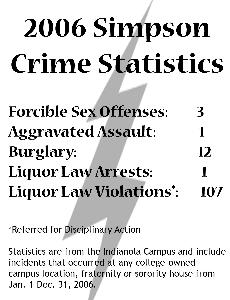Simpson security releases annual crime report

October 10, 2007
Simpson’s Campus Security Department recently released its annual, legally-mandated review of crimes reported on campus during the last calendar year.
“Federal law requires that colleges and universities disclose information about crime on and around their campuses, and also to publish their security policies,” Director of Security Chris Frerichs said.
This report is required of colleges and universities by the Campus Security Act, which specifies that a review of campus crime must be published and made available to the public by Oct. 1 of each year.
The Campus Security Act was inspired by another federal mandate, the Jeanne Clery Disclosure of Campus Security Policy and Campus Crime Statistics Act, which was instituted in response to the rape and murder of the 19 year-old Lehigh University freshman. Previous to the act, 38 violent offenses had occurred on the Lehigh campus that had not been reported. The premise of the act’s disclosure requirement is that, had Clery and her family been aware of the university’s crime statistics, Clery might have taken steps that would have prevented her assailant from entering her room.
The Campus Security Report includes detailed information on the kinds and frequency of crimes reported over the last three years, such that both security personnel and the interested public may compare the numbers and view whether or not there have been significant increases or decreases in the various areas.
Crime categories listed in the publication of report statistics include murder, negligent and non-negligent manslaughter, forcible and non-forcible sexual offenses, robbery, aggravated assault, burglary, car theft, arson, liquor law violations and arrests, drug law violations and arrests, and illegal weapons law violations and arrests. A glossary of crime definitions can be found on the security page of Simpson’s Web site.
The report is not only informative for those who live and work on and around campus, but also a way for security to gauge the frequency and changes in crime patterns to better utilize security procedures.
“If we see a category that shows an increase from the previous years we can focus our safety and security programs to address this,” Frerichs said.
Among the listed crime categories, the top-two reported themes are liquor law violations and burglaries.
Where enforcement is concerned, the trend of campus security measures seems to be crime prevention, as many reported cases involve the loss of personal property or careless personal action, and cannot be brought to restitution.
“My bike was stolen sophomore year,” senior Jared Dowdell said. “I reported it promptly, and security personnel were very courteous, but said that there was not much they could do to help out.”
The only perceivable increase in campus crime is in the burglary category. Though an increase in any type of crime could be viewed as disconcerting to security personnel, a positive interpretation can be taken.
“Students may be reporting more incidents to security,” Frerichs said. “They could be taking a more active role in their own safety and security, and they need to be proactive when it comes to their own safety and security.”
Frerichs went on to offer some tips to students on how to bolster the security of themselves and their property.
“Remember not to prop outside doors, keep your room doors closed when not present in the room, do not let anyone into your building that you do not know, and keep your vehicles locked and valuables in the trunk.”
Specific to the Clery Act’s expansion of rights for the victims of sexual assault is Simpson’s Campus Security and Safety Guide’s emphasis on protocol for the prevention of and reaction to instances of sexual offenses. The information is directed not only at potential victims, who are statistically women, but also at potential victimizers.
This information can be important to incoming students, who typically consider their safety and the overall integrity of their campus in the college selection process.
“I feel that Simpson has a safe campus,” freshman Sara Olson said. “I was told to be careful at parties before I got here, and to watch out for myself.”
Detailed information on campus security, crime prevention, and crime response can be found, along with the official Simpson security policy, at the Security Office in Brenton Student Center.












